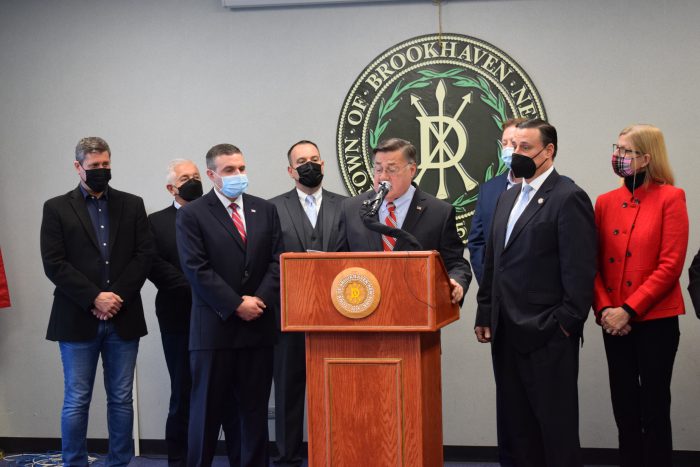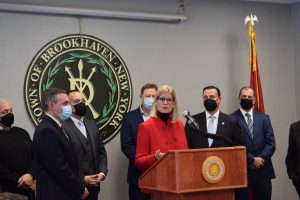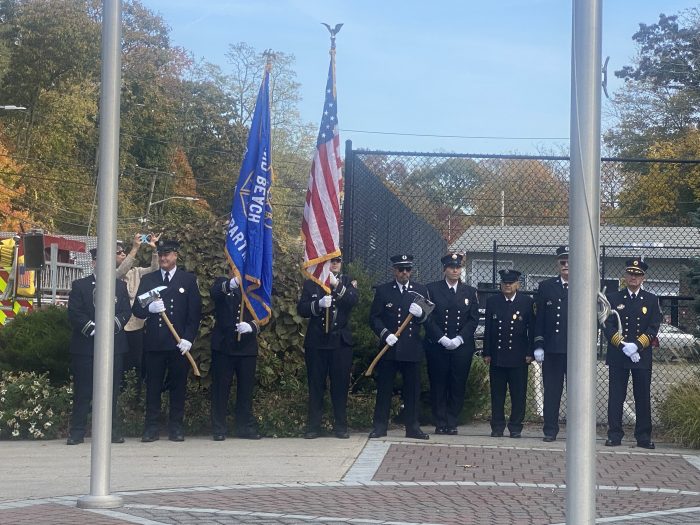The decades-long proposal to electrify the Port Jefferson Branch line of the Long Island Rail Road is nearing yet another derailment.
The Metropolitan Transportation Authority, public owner of LIRR, is expected to unveil its 2025-2044 20-Year Needs Assessment in October. Larry Penner, a transportation analyst and former director for Federal Transit Administration Region 2, considered that document pivotal for the project’s future advancement.
“If the project is not included in that 20-year document, then none of us are going to be alive to see electrification,” he said, adding pessimistically that electrification “is not on the radar screen” of senior MTA or state-level officials.
Requests for comment submitted to the press offices of the MTA, Gov. Kathy Hochul (D) and U.S. Congressman Nick LaLota (R-NY1) went unanswered.
A cry unheard
Generations of North Shore residents and community leaders have called upon the MTA to electrify the Port Jeff line to no avail.‘It’s appalling that they’re using diesel in this day and age.’
— Bruce Miller
Town of Brookhaven Supervisor Ed Romaine (R) has been among Long Island’s loudest and most prominent proponents of electrification in recent years. In an interview with TBR News Media last summer, he said public investment has shifted away from the Island.
“Our voice has not been raised,” he said. “There hasn’t been an investment in providing modern technology” to this region.
Village of Port Jefferson Mayor Margot Garant voiced similar frustrations. According to her, a fully electrified rail would boost local and regional economies, expediting travel to Manhattan and between North Shore communities, namely transit to and from nearby powerhouse Stony Brook University.
The project “would incentivize people being able to take the train not only into Stony Brook but into the city in a really timely manner,” she said.
From an environmental perspective, former Port Jeff Village trustee Bruce Miller decried the existing railway infrastructure as “ludicrous.”
“It’s appalling that they’re using diesel in this day and age,” he said, adding, “Everyone is making every effort for green energy in all fields except for the MTA and the Long Island Rail Road.”

State legislators join the cause
Local leaders are not alone in their disappointment over the long delay. State Sen. Anthony Palumbo (R-New Suffolk) condemned what he considered an imbalance between the state taxes Long Island spends and the infrastructure dollars it gets from Albany.
“Long Islanders already contribute greatly to the MTA and deserve better access to more reliable and dependable rail service,” he said in an email, referring to Port Jefferson Branch electrification as a “critical project.”
At the western end of the branch, state Assemblyman Keith Brown (R-Northport), whose district includes travelers from Huntington, Greenlawn and Northport stations, expressed dismay over the state’s billowing budget yet few returns for North Shore residents.
He noted the apparent contradiction between Albany’s green energy priorities and the MTA’s continued use of diesel locomotives, which are due for replacement in the coming years.
Referencing the 2019 Climate Leadership and Community Protection Act, which targets an 85% reduction in statewide greenhouse gas emissions from 1990 levels by 2050, Brown regarded the continued dependence upon diesel technology as inconsistent with state law.
“They can’t really replace the existing fleet with diesel trains,” he said. “At the same time they’re calling to stop the use of gas in homes, the MTA and LIRR can’t be purchasing diesel locomotives.”
The Empire State Passenger Association is a transit advocacy group that aims for improvements in public transportation services throughout New York state. ESPA president Gary Prophet said the passenger association has endorsed Port Jefferson Branch electrification over the years, referring to the project as necessary and justifiable given the volume of commuters along the line.
“That is a heavily used branch of the Long Island Rail Road that should be electrified,” he said. “It probably should have been electrified in the past, but it just hasn’t happened for a variety of reasons.”
A history of inaction
The original concept of Port Jeff line electrification dates back over half a century. However, planning began in earnest in the early 1970s when electrification of the North Shore line extended up to Huntington.
Derek Stadler, associate professor and web services librarian at LaGuardia Community College in Long Island City, has closely followed historical developments along the Port Jeff Branch.
He attributes the failures to electrify the line to a combination of resistance from property owners near the tracks, engineering challenges, financial setbacks and bad luck.
“In the ‘80s, they had money set aside to start working on it though they hadn’t secured the funds to complete it,” he said. “Then in 1985, the president of the MTA postponed that indefinitely.” Stadler contends this was the closest the project ever was to moving forward.
In the ‘90s, the MTA launched a fleet of dual-mode locomotives which are still in use today. Despite the good intentions, Stadler maintains that this fleet has not adequately substituted for electric service. Given the high costs to repair and replace outdated train cars, Stadler regarded this effort as a poor long-term investment.
“They have spent more money on that new fleet and repairing them than if they would have done the electrification way back in the ‘80s,” he said.
Prioritization problem
The current cost estimate of Port Jeff Branch electrification is $3.6 billion, though that figure will almost certainly climb. To secure these dollars, however, the North Shore is competing against other project proposals across Long Island and New York state.‘If I’m the MTA, I’m electrifying the East End before I electrify the North Shore.’
— Richard Murdocco
Throughout LIRR’s history as a public railroad company, North Shore riders have lost out consistently to their inland counterparts traveling along the Ronkonkoma line. Richard Murdocco, adjunct professor in the Department of Political Science at SBU, chronicled this pattern, saying the pursuit of Port Jeff Branch electrification continues running up against the hard realities of the MTA’s prioritization scheme.
“The question is: Is electrification really the priority on the North Shore, or should you electrify east of Ronkonkoma?” Murdocco said. Given the spur of recent growth in Yaphank and new developments in the Town of Riverhead, he added, “If I’m the MTA, I’m electrifying the East End before I electrify the North Shore.”
Further hampering investment into the Port Jeff Branch is the topography along its route. Given the large hills and frequent bends, the flatter main line may win the day for its comparably simple engineering logistics.
Murdocco said the MTA could either electrify the Port Jeff Branch, which “meanders along the hilly terrain, or you get a straight shot through the Pine Barrens, where there’s already talk of them doing it, where they’re welcoming it and where there are no neighbors to disrupt.”
Political and financial distress‘Suffolk County does not have the political clout that it used to.’
— Larry Penner
Penner claims the political and financial currents are also working against North Shore residents. Suffolk County’s state representatives are increasingly in the legislative minority in Albany, leaving mere “crumbs on the table” for infrastructure improvements.
“Suffolk County does not have the political clout that it used to,” he said.
Even so, the MTA is encountering a systemwide economic crisis from the COVID-19 pandemic, with daily ridership hovering around 65% from pre-pandemic levels. Murdocco insists that many of the labor trends unleashed by COVID-19 will likely linger indefinitely.
“There’s no denying remote work is here to stay,” the SBU adjunct professor said, adding, “We don’t know how long the ramifications of the pandemic will last.”
Meanwhile, the MTA is facing even greater fiscal strife over looming labor negotiations. With recent inflation, Penner said the agency could lose potentially hundreds of millions from renegotiated union contracts.
“All of this plays into the bigger picture of MTA’s overall health,” Penner said, which he considered dismal based on state Comptroller Thomas DiNapoli’s (D) most recent analysis. “They’re barely staying afloat maintaining existing service, systems and repairs,” the former FTA official added.
Penner, Stadler and Murdocco expressed collective pessimism about Port Jefferson Branch electrification getting underway within the next decade. “As of right now, I do not see this project happening within 10 years because I do not see a fiscal way for anyone to pay for it, given the MTA’s current financial status,” Murdocco said.
Looking for answers
Given the hefty $3.6 billion price tag, Miller proposed exploring alternatives to electric service. He cited examples in Germany, where zero-emission hydrogen-powered train cars recently went online.
“Hydrogen technology is new but they’ve developed it, and it’s working in Germany,” the former village trustee said. “I don’t think they’re exploring enough options here.”
But implementing high-tech propulsion technologies may be out of reach for the MTA, which uses a late 19th-century fuel source to power the Port Jeff line. When asked about these potential innovations, Brown expressed skepticism.
“As far as hydrogen is concerned, that’s all it is right now — experimental,” the state assemblyman said. Rather, he favored pursuing electrification in a piecemeal, station-by-station fashion, dispersing infrastructure funds for the project over several annual budgets.
Penner implored community members to adopt a policy of maximum pressure upon their elected representatives.
“I wouldn’t give a dime to any elected official unless, with your campaign contribution, there’s a little note in your check [that says] you have to promise me that electrification of Port Jefferson will be your number one transportation priority,” he said.
Stadler emphasized executive support, arguing that several system expansions during the administration of former Gov. Nelson Rockefeller (R) were made possible by the chief executive’s commitment to seeing them through.
“A lot of money has to be budgeted for it,” he said. “State leaders have to be involved in it, and pressure from the governor” can be a reliable instrument.
To make the electrification dream a reality, Garant said all levels of government should pool their energies around this cause. “It’s certainly going to be a long-term plan for the region,” she said. “You need partners on every level, from the federal and state levels to the town and county.”
Prophet said megaprojects, such as the $11 billion East Side Access extension into Grand Central Madison, have taken up much of the political and economic capital in New York state.
“I think there’s a lot of emphasis on large projects that make a big splash,” the passenger association president said. “Politicians need to spend a little more time on smaller projects that may not make a big splash but may help commuters and people looking to travel between cities.”
Setting the stakes, Penner returned to the 20-year capital needs assessment. He equated the North Shore’s present predicament to a baseball game.
“You’re in the ninth inning with two outs,” he said. “The last at-bat is the 2025-2044 20-year capital needs assessment.” He concluded by saying, “If this project is not included in that document, then the ball game is over.”



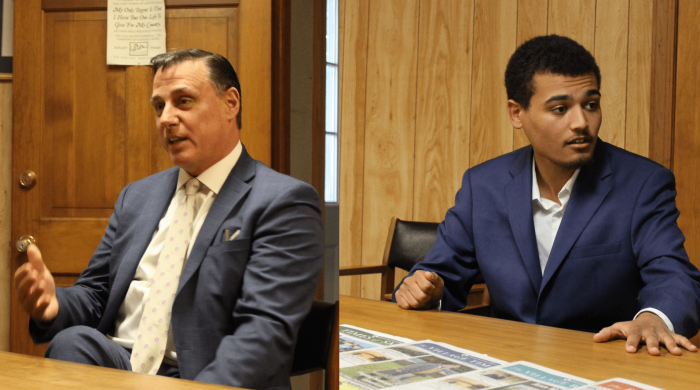
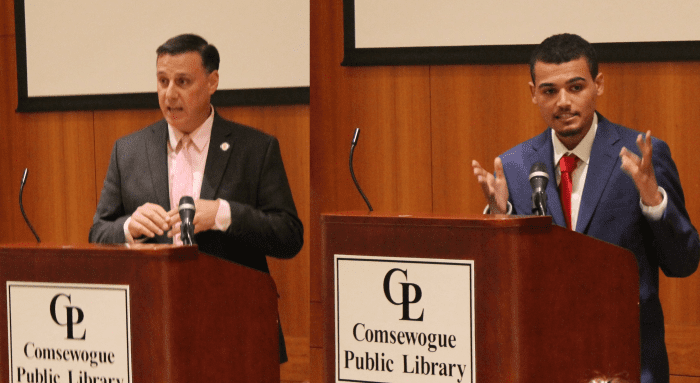


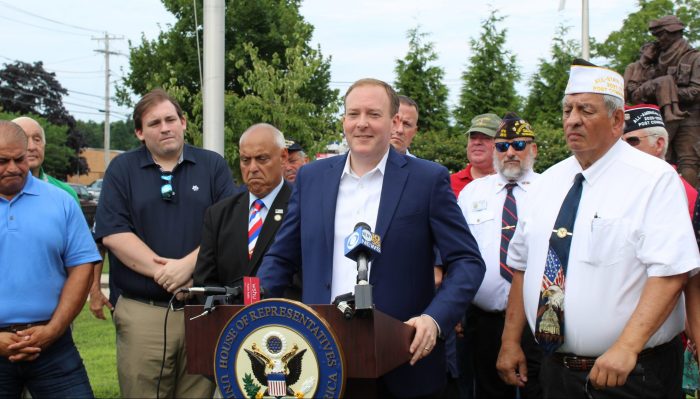



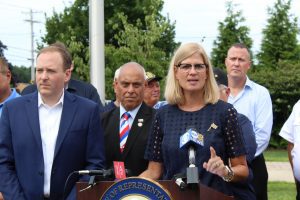

 Seeing this as a public safety hazard, village officials closed down the intersection to traffic, igniting an intergovernmental dispute between the village and DOT.
Seeing this as a public safety hazard, village officials closed down the intersection to traffic, igniting an intergovernmental dispute between the village and DOT. Responding to the ongoing construction, Joe Palumbo, the village administrator, offered thanks to DOT and to state Sen. Anthony Palumbo (R-New Suffolk) for expediting the reconstruction efforts. The Palumbos are not related.
Responding to the ongoing construction, Joe Palumbo, the village administrator, offered thanks to DOT and to state Sen. Anthony Palumbo (R-New Suffolk) for expediting the reconstruction efforts. The Palumbos are not related.
